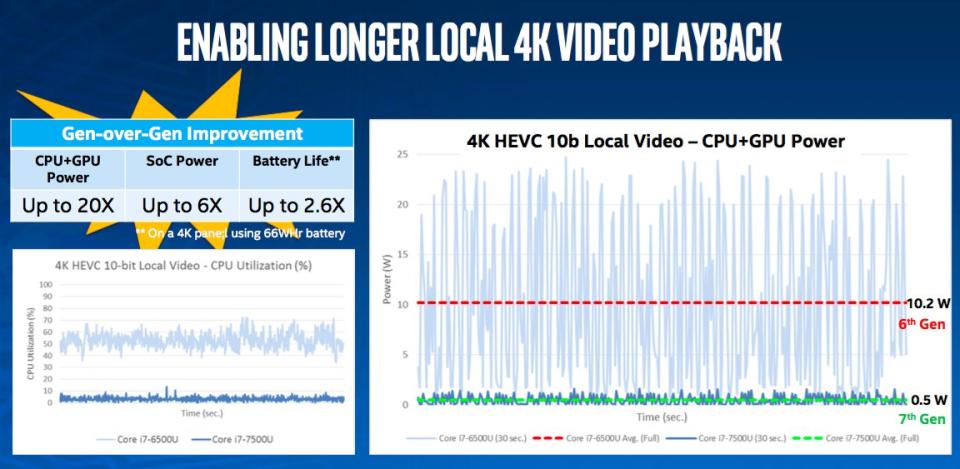Intel's seventh-generation Core CPUs will devour 4K video
And yes, they’ll make everything else faster too.

4K video is finally gaining a foothold in home theaters this year, but for most PCs it's practically kryptonite. Even if you're lucky enough to have a powerful computer, dealing with such high-resolution video is a surefire way to spike your CPU usage and gobble up battery life. So it's little surprise that Intel made 4K performance the centerpiece of its long-awaited seventh generation Core processors, which were officially announced today. You can also look forward to a slew of other speed-enhancing features when the new chips hit laptops in September.
So just how good are these new batch of Core processors? How about a CPU utilization rate of around 5 percent and power usage of 0.5 watts on the new Core i7-7500U while playing local 4K video. That's compared to 40 to 70 percent CPU usage and a 10.2 watt power draw on its predecessor, the i7-6500U. And when playing 4K VP9-encoded video on YouTube, the new seventh generation i7 clocks in at 10 to 20 percent CPU usage while drawing 0.8 watts of power. The previous chip, on the other hand, ate up 70 to 80 percent of the CPU while taking up 5.8 watts of power.

Even as a computer geek, it's been hard to get excited over new processors over the last few years. Intel, for the most part, has focused on steadily improving its lineup instead of aiming for dramatic performance gains. (My fourth-generation quad-core desktop chip can still go toe-to-toe with sixth-gen offerings.) But when it comes to 4K, Intel has delivered an evolutionary upgrade. And while it might not sound that important yet, it sets the stage for laptops and desktops that need to drive the new video standard.
Specifically, Intel added hardware encoding and decoding capabilities for both 10-bit HEVC 4K video and 8 to 10-bit VP9 video. There's also HDR and wide color gamut support, but Intel says it's up to manufacturers to implement the two competing HDR standards, Dolby Vision and HDR10. On top of just letting you watch more 4K video, the new chips' encoding performance could be a huge deal for anyone editing media, with speeds between 1X and 3X real-time for 30FPS 4K.
Intel's seventh generation Core processors (codenamed "Kaby Lake") are basically a refined version of the company's Skylake design from last year. Once again, they're built on a 14 nanometer process, and they rely on Intel's Speed Boost feature, which pushes the chips to their maximum speed faster than previous generations. Unfortunately, the company isn't saying much about its seventh gen desktop lineup yet, but we'll hopefully hear details early next year.
The new laptop chips are divided into two groups: the "Y-series" for thin designs using up to 4.5 watts of power, and the "U" series for faster performance (or just about every other type of laptop). And while there's still a Core M3 processor in the new lineup, Intel has dumped the M5 and M7 models in exchange for the power efficient Y-series. Base clock speeds range between 2.4 GHz and 2.7 GHz for the U-series chips, with boost speeds up to 3.1GHz on the Core i5 and 3.5GHz on the Core i7. And for the more efficient Y-series, base speeds run between 1GHz and 1.3GHz, with larger boost figures between 2.6GHz and 3.6GHz.

When it comes to typical web browsing, Intel claims the new i7-7500U is 19 percent faster than the i7-6500U, while i7-7Y75 chip is 18 percent faster than the M7-6Y75, as measured by WebXPRT 2015. And when it comes to productivity, the company says the new CPUs are around 12 percent faster than their predecessors, based on SYSmark 2014 figures. Sure, they're not exactly exciting upgrades if you have a fairly new laptop, but if yours is getting long in the tooth, you'll definitely notice the difference. And while I didn't get any exact figures on battery life, you can expect some sort of improvement (especially when watching videos).
So what do these new chips mean for you? Basically, if you're in the market for a new laptop, it's worth waiting for new models featuring the seventh gen CPUs in September. And if you're planning to build or buy a new desktop, sit tight until January.
